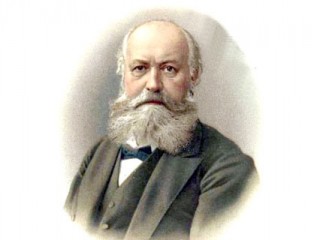
Charles Gounod (En.) biography
Date of birth : 1818-06-17
Date of death : 1893-10-18
Birthplace : Paris, France
Nationality : French
Category : Famous Figures
Last modified : 2011-02-10
Credited as : Composer, Prix de Rome award ,
The French composer Charles Francois Gounod is best known for his operas. His music tends to be more lyric than dramatic, his melodic writing at its best revealing a considerable warmth of feeling.
Charles Gounod was born on June 17, 1818, in Paris. His father was a prominent painter; his mother was a pianist, and Charles received his first musical education from her. In 1836 he entered the Paris Conservatory, where he studied counterpoint with Jacques Fromentin Halevy and composition with Jean Francois Lesueur.
In 1837 Gounod won second place in the coveted Prix de Rome award and in 1839 the Grand Prix. This enabled him to study in Italy, where he was exposed to the choral music of Giovanni Pierluigi da Palestrina. This remained an important influence throughout his life, perhaps even to the detriment of his own choral writing. Returning from Rome through Austria, he also had the chance to hear some of the more romantic compositions of Robert Schumann and Felix Mendelssohn.
For a time Gounod studied theology and even considered becoming a priest. His theological interests ultimately earned him the title "Abbe." Eventually he returned to music, and he attempted to gain success through the composition of operas, the surest road to fame for any French composer. His first opera, Sapho (1851), achieved only a moderate success. With his fourth opera, Faust (1859), he achieved international renown. Although both the libretto and the music have been criticized for their sentimental oversimplification of Goethe's great drama, Faust maintained its position as the most popular French opera in the repertoire for almost a century. Gounod completed 12 operas, but only one other, Romeo et Juliette (composed 1864, first performed 1867), has remained in the repertoire. Its fame rests on Juliette's waltz song and the numerous love duets.
From 1870 to 1875 Gounod lived in London, where, in addition to presenting concerts and composing a number of religious works, he organized the Gounod Choir, later to become the Royal Choral Society. In his last years he concentrated almost exclusively on composing large choral works, but none of these added to his stature as a composer. He died at Saint-Cloud on Oct. 18, 1893.
Two short compositions by Gounod have attained sufficient popularity to merit mention. One is the orchestral Funeral March for a Marionette (1873), which captures perfectly the peculiar humor suggested in the title. The other is the Ave Maria (1859) based on Johann Sebastian Bach's first prelude from The Well-tempered Clavier. This has been criticized as a sentimentalization of the work of a great master, but it is in actuality an ingenious display of compositional craft in which Gounod kept Bach's prelude unchanged but used it as an accompaniment for his own expressive melody.
Gounod wrote his Autobiographical Reminiscences (trans. 1896; repr. 1970). There are no major biographies of Gounod in English. Norman Demuth, Introduction to the Music of Gounod (1950), is a study of his work.
















